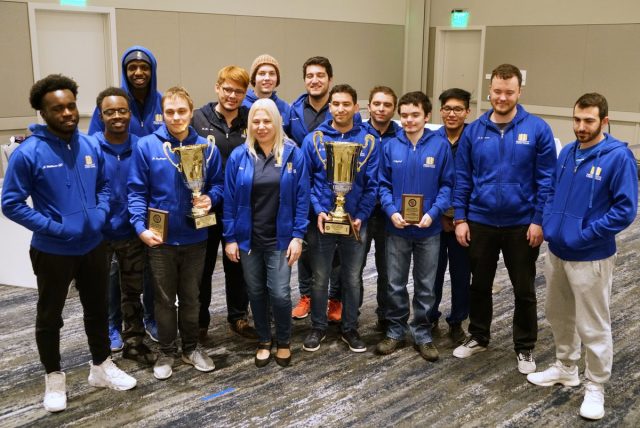 Webster University chess team, Photo David Llada
Webster University chess team, Photo David Llada A big roster of stars is a blessing in any sports team. The Pan American Intercollegiate Championships are no different, where chess programs with deep pockets bring a deep bench—multiple teams with strong GMs. Webster-A, who began with a 100-plus edge over rivals UT-Dallas and Texas Tech, brought a B-team with an average US Chess rating of 2665, third-best. As Texas Tech learned, if you get by one Webster, there’s another staring back at you in the next round. In the end, Webster, with 5 ½ out of 6 match points, took its seventh PanAms title in a row, and its fifth in clear first. (Trivia: In 2016, Webster-A and Webster-B tied for first, outdistancing all others.) Webster’s mascot, the Gorlok, may be imaginary, but its chess prowess is not. Webster has won a claim to first place since the start of its program in 2012. Three teams scored 5-0, and four finished with 4 ½ -1 ½. In tiebreak order (four-board US Chess rating average is given in parentheses):
UT-Dallas, who was shut out of last year’s Final Four on tiebreaks, took no such chance this year. In its Round 6-match against University of Maryland Baltimore County, a 10-time PanAms winner, the only decisive game was GM Razvan Preotu-IM Matyas Marek on Board 3. But it’s an out-for-blood hair-raiser in which White castles long, while Black leaves his king in the center and pushes his queenside pawns all the way down to White’s palace guard. Ultimately, Preotu, a hot hand for UTD, found a dramatic closer. UTD Coach IM Rade Milovanovic can retire after 20 years on the same winning streak he started in 1999.
[pgn] [Event "2018-PanAm Intercollegiate"] [Date "????.??.??"] [White "Preotu, Razvan"] [Black "Marek, Matyas"] [Result "1-0"] [ECO "B67"] [PlyCount "71"] [WhiteClock "0:28:59"] [BlackClock "0:00:34"] 1. e4 c5 2. Nf3 d6 3. d4 cxd4 4. Nxd4 Nf6 5. Nc3 Nc6 6. Bg5 e6 7. Qd2 a6 8. O-O-O Bd7 9. f4 b5 10. Bxf6 gxf6 11. f5 Qb6 12. Nxc6 Bxc6 13. Kb1 b4 14. Ne2 e5 15. Ng3 Qc5 16. Bd3 h5 17. h4 Bh6 18. Qe2 Qe3 19. Rh3 Ke7 20. Qf1 Qf4 21. Qe1 a5 22. Nxh5 Qg4 23. Ng3 Rhb8 24. Be2 Qg8 25. Bc4 a4 26. Qe2 b3 27. cxb3 axb3 28. axb3 Rb6 29. Nh5 Ra5 30. Nxf6 $1 Kxf6 31. Rxd6+ Ke7 32. Rxh6 Qa8 33. Rd3 Ra1+ 34. Kc2 Bxe4 35. Rxb6 Qa2 36. f6+ {With mate-in-one against him, Marek resigns. UTD-A moves into the 5-1 score group, with an assured berth in the Final Four.} 1-0[/pgn]
Tiebreak tension The top four US universities qualify for the Final Four of College Chess—the playoffs for the US collegiate National Championship. But unlike the PanAms, the Final Four limits universities to just one squad. (Although the team needn’t be the same individuals who won the spot in the PanAms.) So, although Webster teams finished 1st and 3rd, one of the three teams that tied for fifth place with 4 ½ match points had to be given a shot at the overall championship in April. UT-Grande Valley, St. Louis University, and Texas Tech—all at 4 ½ —hoped to get into the Final Four for bragging rights to showpiece the scholarship programs that bring together their grandmaster teams. The conscientious team of top-flight tournament directors had to apply tiebreaks.
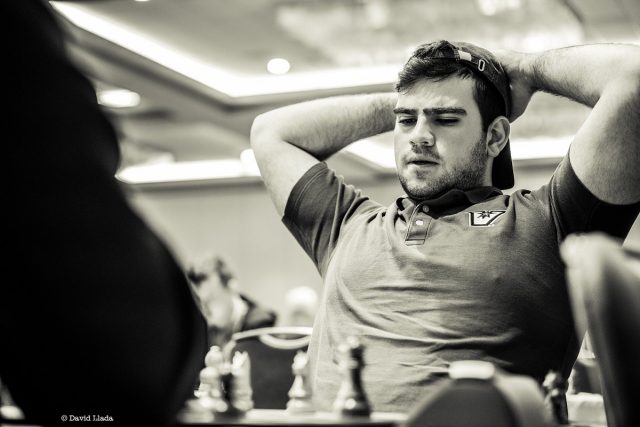 Hovhannes Gabuzyan, first board for the University of Texas Rio Grande Valley, Photo by David Llada for Bay Area Chess
Hovhannes Gabuzyan, first board for the University of Texas Rio Grande Valley, Photo by David Llada for Bay Area Chess The critical tiebreak multiplier at the PanAms is a team’s total game points. Texas Tech had piled up the game points in the early rounds on its run to Table 1, where in Round 5, the squad scored a 2-2 tie against slightly higher-rated Webster-B. But the Swiss system of pairing rarely allows a good deed to go unpunished. The final round saw Webster’s big brother show up on Table 1 turf for family revenge against Tech. And Webster-A delivered a drubbing, allowing only a single, board-three draw. The tiebreak collapse included a time-pressure blunder by Tech’s top board, Andrey Baryshpolets, who had performed brilliantly in their surge. But, playing only on increment with an extra, passed pawn, he fell for a piece-losing trap set by GM Illia Nyzhnyk.
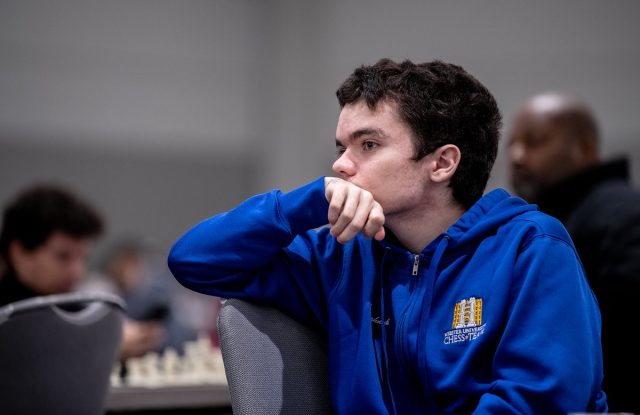 GM Illia Nyzhnyk, Photo David Llada
GM Illia Nyzhnyk, Photo David Llada [pgn] [Event "2018-Pan-Am Intercollegiate"] [Date "????.??.??"] [White "Nyzhnyk, Illya"] [Black "Andersen, Alec C"] [Result "1-0"] [ECO "D02"] [PlyCount "59"] [WhiteClock "1:14:47"] [BlackClock "0:34:11"] 1. d4 d5 2. Bf4 Nf6 3. e3 c5 4. Nf3 Nc6 5. Nbd2 cxd4 6. exd4 Qb6 7. Nb3 Bg4 8. Be2 e6 9. h3 Bxf3 10. Bxf3 Qd8 11. O-O Bd6 12. Qd2 Qc7 13. Bxd6 Qxd6 14. c3 O-O 15. Be2 a6 16. Nc5 Ra7 17. Rae1 b6 18. Nxa6 Rfa8 19. b4 b5 20. Bxb5 Ne7 21. Nc5 Rxa2 22. Qe3 R8a3 23. Bd3 Ng6 {Diagram [#] 23. ... Ra8 was better, but White still keeps an advantage by pushing the passed b-pawn.} 24. Bb1 $1 Ra1 25. Bxg6 Rxe1 26. Bxf7+ Kxf7 27. Rxe1 Qc6 28. b5 {Black resigns. If} Qxb5 29. Qxe6+ Kg6 30. g4 {, and Black's king is hunted down while his queen and rook look on from the queenside.} 1-0[/pgn]
Can a team this bright really be a dark horse?
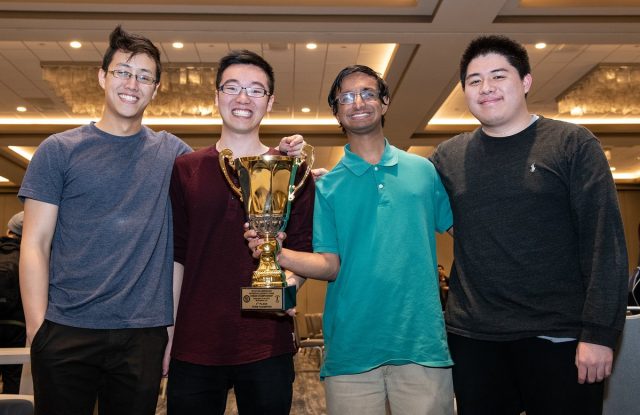 The Harvard chess team: Photo David Llada
The Harvard chess team: Photo David Llada Harvard gives no monetary support to chess. This year’s team featured four seniors who got to San Francisco on their own—and frankly came for the fun of it. They were delighted with the outcome, of course, but said that they would have been happy with the weekend if they hadn’t qualified. In board order and with majors in parentheses:
- GM Darwin Yang (economics)
- IM Richard Wang (neuroscience)
- FM Varun Krishnan (computer science)
- NM Bryan Hu (electrical engineering)
Harvard clinched its standing with a last-round win against SLU-B, as Wang and Hu won and, in the final game going on the table, Yang, as Black against GM Francesco Rambaldi, played enterprisingly to reach a position in which he had a rook and bishop against a queen. But he also enjoyed three passed pawns. Rambaldi chose to repeat the position with checks, conceding the match. The game, on Table 4, wasn’t captured by the DGT board-broadcast, but here’s the score:
[pgn] [Event "2018 Pan American Intercollegiate Champ"] [Site "?"] [Date "2018.12.30"] [White "Rambaldi, Francesco"] [Black "Yang, Darwin"] [Result "1/2-1/2"] [ECO "E15"] [WhiteElo "2599"] [BlackElo "2575"] [PlyCount "98"] [EventDate "2018.??.??"] 1. d4 Nf6 2. c4 e6 3. g3 d5 4. Bg2 Be7 5. Nf3 O-O 6. Nc3 c6 7. O-O Nbd7 8. b3 b6 9. Qc2 Ba6 10. e4 dxc4 11. Rd1 Rc8 12. Bf4 h6 13. h3 Bb4 14. bxc4 Bxc4 15. Nd2 Ba6 16. Qb3 Be7 17. Nc4 Bxc4 18. Qxc4 b5 19. Qd3 Qa5 20. Bd2 b4 21. Ne2 Qb5 22. Qf3 e5 23. Bf1 Qb8 24. g4 Rfe8 25. Rac1 c5 26. dxc5 Nxc5 27. Ng3 Ne6 28. Nf5 Nd4 29. Nxd4 exd4 30. Bc4 Qe5 31. Bd3 (31. Qb3) 31... Bd6 32. Qg2 g5 33. h4 Kg7 34. Rxc8 Rxc8 35. Rf1 Rc3 $11 (35... Qa5 $19) 36. f4 gxf4 37. Bxf4 Qxf4 38. Rxf4 Bxf4 39. e5 Rxd3 40. exf6+ Kxf6 41. Qe4 Be3+ 42. Kg2 Rd2+ 43. Kf3 Rf2+ 44. Kg3 Rxa2 45. Qf5+ Kg7 46. Qe5+ Kg8 47. Qe8+ Kg7 48. Qe5+ Kg8 49. Qe8+ Kg7 { And Yang secures the draw needed to win the match and go to the 5-1 score group.} 1/2-1/2[/pgn]
“I am also so happy for Darwin Yang of Harvard, a wonderful young man whom I have known for many years and who’s played in many of my events,” Webster Coach and former Women’s World Champ GM Susan Polgar said. “His team beat out other powerhouses to qualify!” Important division team titles Plenty of other teams compete for impressive titles—titles that boost their program’s standing back on campus. Bringing home the trophy goes a long way in catching the attention of college administrators—as well as other students. Division II (2199-2000): University of Michigan Division III (1999-1800): UC Berkeley-B Division IV (1799-1600): Miami Dade College Division V (1599-1400): Oberlin College Division VI (Under 1400): University of Utah Top International Team: Hart House Chess Club (Canada) Top Small College: Northwest University, Oberlin College and Alaska University Best Mixed Doubles: University of Michigan Top board prizes Every successful team needs a “board beast.” The overall point-monster this year is UC-Berkeley’s Tanmay Khattar, the only player to win all six games. Khattar moves up to Expert class. GM Illia Nyzhnyk also merits special notice, piling up 5 ½ points for Webster-A while facing the best on Board 1. Here’s his first-round win over Arizona State U.-A’s NM Alec Andersen [Insert game Nyzhnyk-Andersen] Board 1: GM Illia Nyzhnyk Webster-A (5 ½ points) Board 2: GM Kamil Dragun UT-RGV-A (5 points) Board 3: Tanmay Khattar UC-Berkeley (6 points) Board 4: NM Bryan Hu Harvard (5 ½ points) Alternate: WCM Claudia Munoz Texas Tech-B (3 points) There are always big upsets at the PanAms. The University of Wisconsin-Whitewater (1782) took home the plaque for Biggest Team Upset for defeating Washington University of St. Louis (2128). John Ludlum of the University of Utah, rated 794, earned Biggest Individual Upset for his draw against an Expert rated 2011. Organizers and staff make it happen It’s no accident that the 2018 PanAms drew universal praise for its organization and direction. Organizer Judit Sztaray was named 2017 Organizer of the Year by US Chess. She’s executive director of Bay Area Chess, the sponsoring US Chess affiliate, which earned the 2018 Chess Club of the Year award. The TD crew of a national team event always has a challenging technical job, and this year’s blue-ribbon crew, led by Chief TD (NTD and IA) Tom Langland, was flawless and friendly. Floor TD was NTD Glenn Panner, Assistant TD was Jordan Langland, Pairings TD was NTD John McCumiskey.
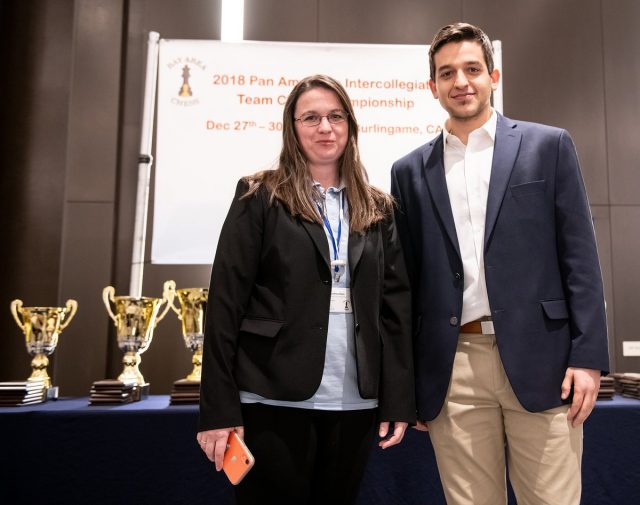 Judit Sztaray of Bay Area Chess and Peter Giannatos of the Charlotte Chess Center
Judit Sztaray of Bay Area Chess and Peter Giannatos of the Charlotte Chess CenterNext year’s PanAms will be held December 27-30 in Charlotte, North Carolina. So make your plans to get in on the history and fun. And remember to approach your college student government and administrators early for possible funding! https://twitter.com/bayareachess/status/1078707226708078593 Al Lawrence is the managing director of the US Chess Trust, and a frequent contributor to CLO and Chess Life Magazine. Next up in the Bay Area: A strong International spanning from January 1-7, the Bay Area International. Follow along on the official site.
Categories
Archives
- January 2026 (6)
- December 2025 (27)
- November 2025 (29)
- October 2025 (39)
- September 2025 (27)
- August 2025 (29)
- July 2025 (43)
- June 2025 (25)
- May 2025 (24)
- April 2025 (29)
- March 2025 (29)
- February 2025 (20)
- January 2025 (24)
- December 2024 (34)
- November 2024 (18)
- October 2024 (35)
- September 2024 (23)
- August 2024 (27)
- July 2024 (44)
- June 2024 (27)
- May 2024 (31)
- April 2024 (51)
- March 2024 (34)
- February 2024 (25)
- January 2024 (26)
- December 2023 (29)
- November 2023 (26)
- October 2023 (37)
- September 2023 (27)
- August 2023 (37)
- July 2023 (47)
- June 2023 (33)
- May 2023 (37)
- April 2023 (45)
- March 2023 (37)
- February 2023 (28)
- January 2023 (31)
- December 2022 (23)
- November 2022 (32)
- October 2022 (31)
- September 2022 (19)
- August 2022 (39)
- July 2022 (32)
- June 2022 (35)
- May 2022 (21)
- April 2022 (31)
- March 2022 (33)
- February 2022 (21)
- January 2022 (27)
- December 2021 (36)
- November 2021 (34)
- October 2021 (25)
- September 2021 (25)
- August 2021 (41)
- July 2021 (36)
- June 2021 (29)
- May 2021 (29)
- April 2021 (31)
- March 2021 (33)
- February 2021 (28)
- January 2021 (29)
- December 2020 (38)
- November 2020 (40)
- October 2020 (41)
- September 2020 (35)
- August 2020 (38)
- July 2020 (36)
- June 2020 (46)
- May 2020 (42)
- April 2020 (37)
- March 2020 (60)
- February 2020 (38)
- January 2020 (45)
- December 2019 (34)
- November 2019 (35)
- October 2019 (42)
- September 2019 (45)
- August 2019 (56)
- July 2019 (44)
- June 2019 (35)
- May 2019 (40)
- April 2019 (48)
- March 2019 (61)
- February 2019 (39)
- January 2019 (30)
- December 2018 (29)
- November 2018 (51)
- October 2018 (45)
- September 2018 (29)
- August 2018 (49)
- July 2018 (35)
- June 2018 (31)
- May 2018 (39)
- April 2018 (31)
- March 2018 (26)
- February 2018 (33)
- January 2018 (30)
- December 2017 (26)
- November 2017 (24)
- October 2017 (30)
- September 2017 (30)
- August 2017 (31)
- July 2017 (28)
- June 2017 (32)
- May 2017 (26)
- April 2017 (37)
- March 2017 (28)
- February 2017 (30)
- January 2017 (27)
- December 2016 (29)
- November 2016 (24)
- October 2016 (32)
- September 2016 (31)
- August 2016 (27)
- July 2016 (24)
- June 2016 (26)
- May 2016 (19)
- April 2016 (30)
- March 2016 (36)
- February 2016 (28)
- January 2016 (32)
- December 2015 (26)
- November 2015 (23)
- October 2015 (16)
- September 2015 (28)
- August 2015 (28)
- July 2015 (6)
- June 2015 (1)
- May 2015 (2)
- April 2015 (1)
- February 2015 (3)
- January 2015 (1)
- December 2014 (1)
- July 2010 (1)
- October 1991 (1)
- August 1989 (1)
- January 1988 (1)
- December 1983 (1)







